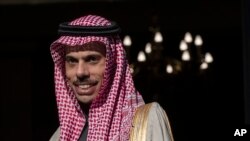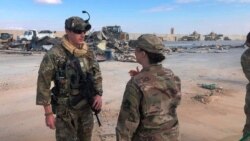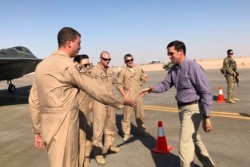Saudi Arabia’s top diplomat says his country does not want U.S. troops to leave Iraq, even as Washington bolsters its military presence in the Saudi kingdom. Saudi Foreign Minister Faisal bin Farhan al-Saud warned that any pullout of American forces from neighboring Iraq could make the region less safe.
The United States has roughly 5,000 troops stationed in Iraq which support and advise Iraqi forces in the ongoing fight against Islamic State militants, also known as IS, mainly in the country’s north.
Iraq resumed joint military operations last week with the U.S.-led coalition to fight Islamic State after a nearly three-week pause that followed heightened tensions with Baghdad over Washington’s targeted killing of a top Iranian general, Qassem Soleimani, on Iraqi soil in January. The Iraqi military, however, also hinted that Baghdad’s relationship with Washington would change after Iraq’s parliament voted recently to expel the U.S. military.
Washington says it does not intend to pull troops out of Iraq.
Faisal bin Farhan al-Saud says the United States acted in its "own legitimate self-defense," when it targeted Soleimani. "The U.S. has proven time and again to be a reliable ally of the [Saudi] Kingdom, and this is also the case with the Trump administration," he said recently in an interview with CNN.
Gulf analyst Cinzia Bianco of the European Council on Foreign Relations says Saudi Arabia’s position is consistent with its views following the U.S.-led invasion of Iraq in 2003.
"From the Saudi point of view, the U.S. is at the center of managing these waves of instability that in part originated from their own invasion of Iraq," she said. "When the region suffers strong waves of instability, the U.S. should be there to deal with them."
Bianco and other analysts say U.S. troops are also viewed as a deterrent to Iran’s growing footprint in the region and the instability it has caused. Washington has strengthened America’s military presence in the Gulf, especially with more troops added to Saudi Arabia’s Prince Sultan Air Base amid rising tensions with Iran.
"Especially at a time of heightened tensions between the U.S. and Iran, if the U.S. would have to withdraw its troops from Iraq, then on the target list of Iran are U.S. troops in Saudi Arabia or other targets in the kingdom itself," said Bianco.
Analysts say Saudi Arabia wants to avoid a direct confrontation with Iran, its powerful regional rival; however, the Trump administration did not step in militarily to defend Saudi interests after what is believed to have been Iran’s drone and missile attack on Saudi oil sites last September. Since then, the U.S. has placed four Patriot batteries in Saudi Arabia, and recently set up Patriot batteries to protect against missiles fired by Iran and Iranian-backed militias in Syria and Iraq.






